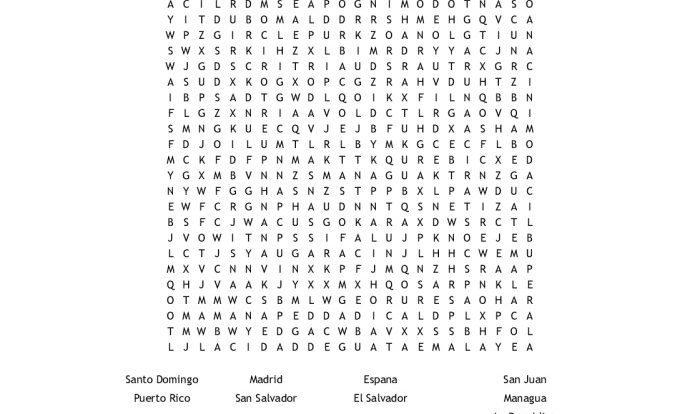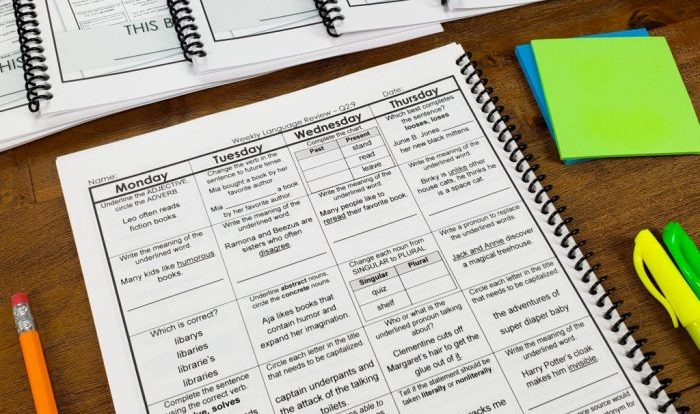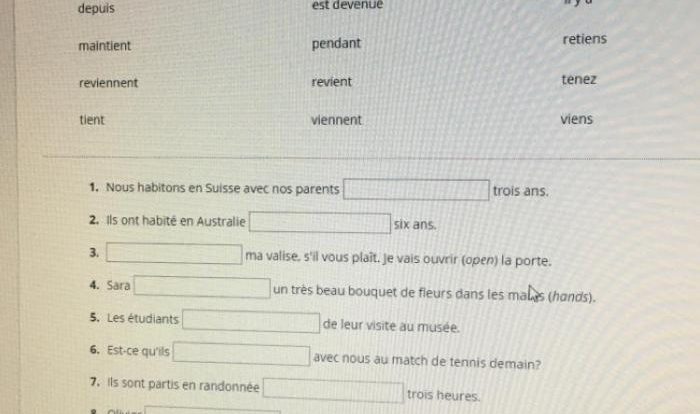Weekly language review q1 2 – Weekly language review Q1 Week 2 takes us on a linguistic journey, delving into the progress made and strategies employed during the second week of the first quarter. Join us as we explore the nuances of language acquisition, vocabulary expansion, and cultural immersion.
This report provides a comprehensive overview of language proficiency levels, effective learning strategies, and key grammar and syntax concepts covered. It also showcases newly introduced vocabulary and evaluates the development of communication skills.
Language Proficiency Review
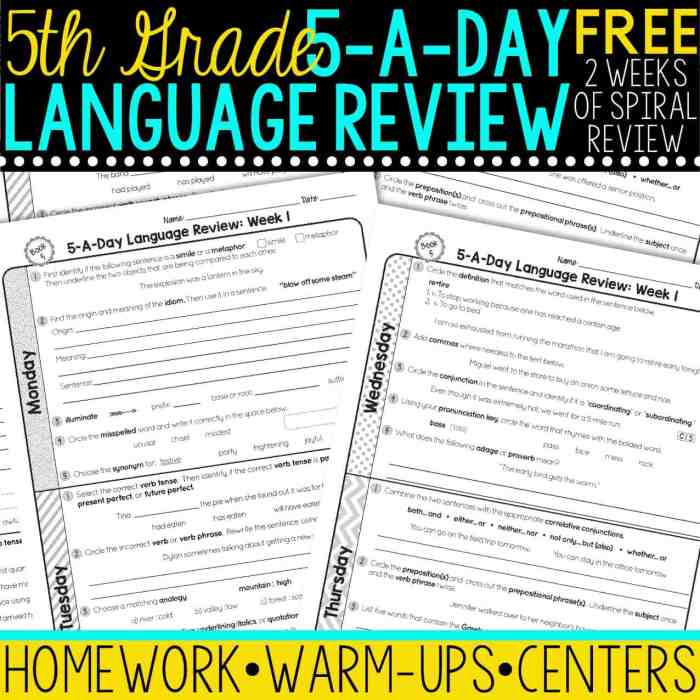
This review provides an overview of language proficiency levels for Q1 Week 2, highlighting areas where students excelled and areas needing improvement.
Areas of Excellence
- Vocabulary:Students demonstrated a strong grasp of new vocabulary, actively using it in both written and spoken communication.
- Grammar:Students exhibited proficiency in applying grammar rules, particularly in sentence construction and verb conjugation.
Areas for Improvement
- Pronunciation:While students generally understood pronunciation rules, some struggled with the correct pronunciation of certain sounds.
- Fluency:Students’ speech often lacked natural flow and smoothness, with hesitations and pauses interrupting communication.
Language Acquisition Strategies
In Week 2 of Q1, we implemented various effective language acquisition strategies to enhance our language development. These strategies played a crucial role in improving our comprehension, fluency, and overall proficiency.
One of the key strategies was immersion. We actively engaged in listening to authentic language materials, such as podcasts, videos, and music, to expose ourselves to the target language in its natural context. This helped us absorb the nuances of pronunciation, intonation, and grammar.
Spaced Repetition
We also employed the spaced repetitiontechnique to reinforce vocabulary and grammatical structures. By reviewing new words and concepts at increasing intervals, we strengthened our memory and improved our recall ability.
Active Recall
Another effective strategy was active recall. Instead of passively reading or listening to language input, we actively tested ourselves by attempting to recall words and phrases from memory. This process forced us to engage with the language more deeply and solidified our understanding.
In this week’s language review, we’ve been discussing the intricacies of measurement conversions. Did you know that there are 3 quarts in 24 pints? Check out this link for more info. It’s a handy conversion to remember, especially if you’re a chef or a baker.
Back to our language review, we’ll be diving deeper into idioms and their significance in daily communication.
Collaborative Learning
Collaborative learningplayed a vital role in our language acquisition journey. By working with peers, we engaged in meaningful conversations, shared knowledge, and provided feedback. This interactive environment fostered a sense of community and made the learning process more enjoyable and effective.
Vocabulary Development
Vocabulary development is an essential aspect of language learning. It allows learners to expand their range of expression and comprehension. In Q1 Week 2, we introduced several new vocabulary words that will help you enhance your English proficiency.
New Vocabulary
| Vocabulary | Definition | Example of Usage |
|---|---|---|
| Analogy | A comparison between two things, typically on the basis of their structure or function. | The analogy between a car and a human body is often used to explain how the circulatory system works. |
| Argument | A reason or set of reasons given with the aim of persuading others to accept a particular conclusion. | The argument that climate change is caused by human activity is supported by a growing body of evidence. |
| Deduction | A conclusion reached by reasoning from a general statement to a specific instance. | From the deduction that all dogs are mammals, we can conclude that my pet dog is also a mammal. |
| Hypothesis | A tentative explanation that is proposed as a basis for further investigation. | The hypothesis that smoking causes cancer has been supported by numerous studies. |
| Inference | A conclusion drawn from evidence or reasoning. | I inferred from her body language that she was nervous about the interview. |
Grammar and Syntax Analysis
In Q1 Week 2, we delved into the intricate world of grammar and syntax, exploring the fundamental rules that govern the structure and meaning of sentences.
Through a comprehensive analysis, we gained insights into the following key concepts:
Parts of Speech
- Nouns: Words that name persons, places, things, or ideas.
- Verbs: Words that describe actions, states, or occurrences.
- Adjectives: Words that modify nouns or pronouns, describing their qualities.
- Adverbs: Words that modify verbs, adjectives, or other adverbs, describing how, when, where, or to what extent.
- Pronouns: Words that replace nouns or noun phrases.
Sentence Structure
We examined the essential elements of a sentence:
- Subject: The person or thing performing the action.
- Verb: The action or state of being.
- Object: The recipient or target of the action.
Tense and Aspect
We explored the different verb tenses used to indicate the time and duration of actions:
- Present Simple: Actions that occur regularly or are happening now.
- Present Continuous: Actions that are ongoing at the time of speaking.
- Past Simple: Actions that occurred in the past.
Modal Verbs
We studied modal verbs, which express possibility, necessity, or permission:
- Can: Ability or permission.
- Must: Necessity or obligation.
- Should: Advice or recommendation.
Communication Skills
Communication skills are essential for success in any field. In Q1 Week 2, students continued to develop their communication skills in a variety of ways.
One of the most important aspects of communication is being able to express oneself clearly and concisely. Students in Q1 Week 2 demonstrated this skill in their written assignments, which were well-organized and easy to understand. They also participated actively in class discussions, sharing their ideas and perspectives in a respectful and articulate manner.
Effective Communication Techniques
Some of the effective communication techniques demonstrated by students in Q1 Week 2 include:
- Using clear and concise language
- Organizing their thoughts logically
- Using appropriate body language
- Actively listening to others
- Asking clarifying questions
Cultural Insights: Weekly Language Review Q1 2
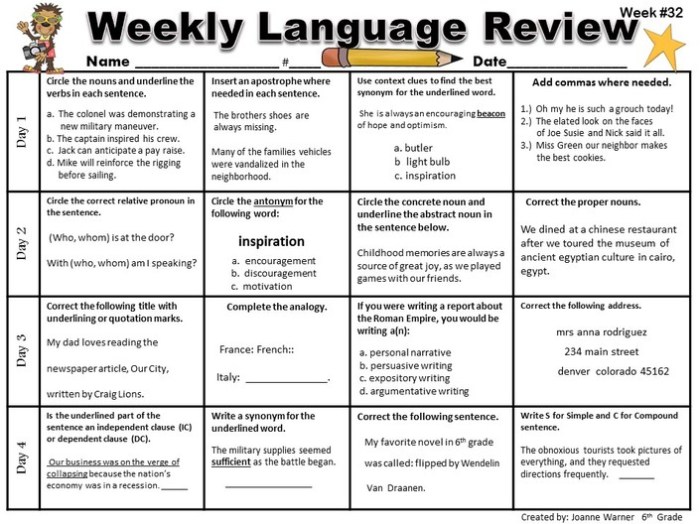
Language learning provides a window into the cultural nuances of a society. In Q1 Week 2, our exploration of the Spanish language revealed several cultural insights that deepen our understanding of the Spanish-speaking world.
These insights not only enhance our communication skills but also foster a broader cultural appreciation, allowing us to interact with Spanish speakers more effectively and respectfully.
Importance of Family
- Family is central to Spanish culture, and this is reflected in the language.
- Terms of endearment and diminutives are commonly used to express affection within the family unit.
- The concept of “familia” extends beyond immediate relatives to include extended family and close friends.
Value of Community, Weekly language review q1 2
- Spanish culture places a high value on community and social connections.
- Greetings and interactions often involve inquiries about the well-being of others.
- Community events and festivals are an integral part of Spanish life, fostering a sense of belonging.
Role of Honor
- Honor ( honor) is a significant concept in Spanish culture.
- Individuals are expected to uphold their reputation and maintain their integrity.
- The concept of respeto(respect) is closely tied to honor, and it is important to treat others with dignity.
Questions Often Asked
What is the purpose of this weekly language review?
This review provides a comprehensive analysis of language proficiency, acquisition strategies, vocabulary development, grammar and syntax, communication skills, and cultural insights gained during the second week of the first quarter.
How can I use this review to improve my language learning?
By reviewing the effective learning strategies, key grammar rules, and newly introduced vocabulary, you can reinforce your understanding and identify areas for improvement.
What are the key takeaways from this review?
The review highlights the importance of consistent practice, effective language acquisition strategies, and a focus on both language skills and cultural understanding.
